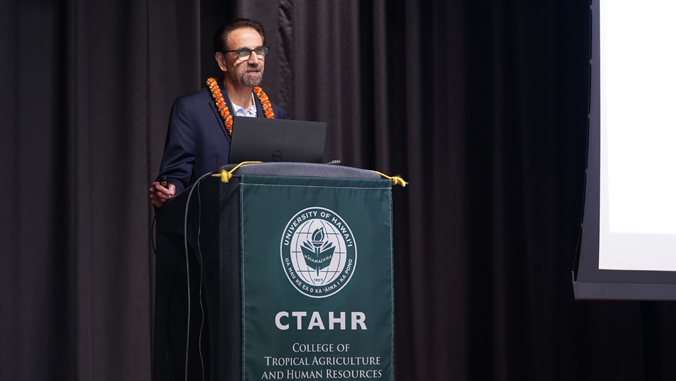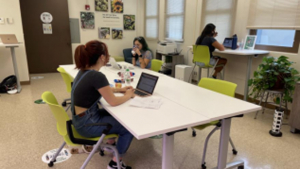
The mission of the University of Hawaiʻi at Mānoa College of Tropical Agriculture and Human Resources (CTAHR) is to secure the future of Hawaiʻi by building local self-sufficiency in food and agricultural products, according to CTAHR’s new Dean Parwinder Grewal who started on March 1. It was part of Grewal’s first speech to CTAHR faculty and staff at the four-day, state of the college conference in April 2024.
“CTAHR’s inclusive vision is to secure the future of Hawaiʻi through collaborative innovation and merging the Western, Asian, Hispanic, and Native Hawaiian knowledge systems,” said Grewal, adding that local self sufficiently has to happen while also, “enhancing the health of Hawaiian ecosystems, families and communities through research, teaching and cooperative Extension.”
Grewal also focused on the challenges in Hawaiʻi that CTAHR research and extension can help address including Hawaiʻi’s energy supply, with more than 80% of the energy being imported (mostly as oil); Hawaiʻi’s food supply with 85–90% of our food being imported; and food security with 11% of families and 1 in 6 children facing food insecurity in the state.

“We can help develop ag stations as hubs of prosperity by establishing sustainable production systems with locally relevant food, feed, forage, fiber, floriculture, timber, seed production, livestock, swine, and small ruminant (sheep, goat) production,” said Grewal.
Grewal also discussed CTAHR’s student enrollment trends over the past five years. Student numbers have declined since the COVID-19 pandemic, however programs such as natural resources and environmental management, molecular biosciences and bioengineering and more are trending upward. In the past three years CTAHR students have also been awarded $780,618 in scholarships to support student success. Currently 43% of CTAHR students are Hawaiʻi residents with Native Hawaiians representing 13% of the student population.
Grewal also identified supporting student success, cooperative extension workforce and extramural awards as other areas that CTAHR will focus on moving forward. CTAHR faculty had a record year in 2023 with $47 million in extramural awards.
The conference included keynote speakers, educational sessions and showcased research at the symposium. CTAHR faculty and staff had the opportunity to tour some of the CTAHR‘s research and Extension stations based on Oʻahu.

